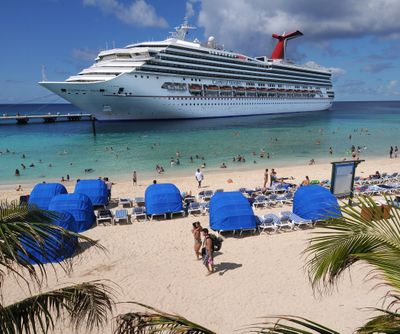The Motley Fool: Carnival cruises to profits

Carnival Corp’s (NYSE: CCL) stock has been getting less expensive recently, making it worth consideration for long-term investors.
In the company’s last reported quarter, net revenue per passenger day improved by 4 percent over year-ago levels, while package bookings also rose. Overall, the company has been outstripping management’s projections. While boosting his full-year profit forecast, CEO Arnold Donald told investors in June that Carnival’s “strong second quarter demonstrates continued momentum as we again achieved a near doubling of adjusted earnings per share.”
Carnival is dealing with some headwinds, though. For example, its average ticket revenue is up by less than 1 percent over the last six months, but would be up by 2.1 percent if it weren’t for exchange rate issues. Rising fuel prices are also producing a drag on earnings growth – though Carnival has limited the impact through its fuel hedging program.
Earnings can be volatile in the cruise ship business, which is sensitive to weakening economic growth. So investors should keep an eye on cash flow. Carnival’s free cash generation is up a healthy 17 percent so far this year, to $2.7 billion. That has helped fund a big increase in capital expenditures (ship upgrades and fleet growth), while leaving plenty of excess cash for additional returns to shareholders. Carnival recently boosted its dividend by 17 percent and the stock recently yielded 3 percent.
Ask the Fool
Q: Am I smart or dumb to buy more shares of a stock I own after its price falls? – H.T., Lancaster, Pennsylvania
A: It depends. You’d be “averaging down,” reducing the average price you paid for your shares. It can be a good move if the entire market has declined, taking your holding with it through no fault of its own – or if the market overreacts to your company’s latest news, sending its shares down more than you think they deserve.
Averaging down isn’t always smart, though, because there’s often a good reason that a stock is dropping. Before you average down, re-evaluate the business’s health and growth prospects.
Q: What’s “forced selling”? – G.R., Cadillac, Michigan
A: It’s something to worry about if the market starts crashing, because it can make a bad situation worse.
Imagine you own shares of a mutual fund that has fallen sharply in value. It’s often best to just hang on, waiting for a recovery – provided you still have faith in the managers. But many shareholders will bail out. When they do, the managers will have to sell off some of the fund’s holdings to generate the cash needed for withdrawals.
When many funds are selling a lot of stocks, that can further depress the stocks’ prices. This can then cause more investors to sell, putting more pressure on stocks. It’s frustrating for fund managers because while they may see lots of bargains, they’re forced to sell, not buy.
Meanwhile, other investors may have bought stocks “on margin” – i.e., with borrowed money. If those stocks fall sharply, the investors will need to put in more money, or sell. Many will sell, causing the market’s downturn to snowball further.
My dumbest investment
My dumbest investment was chasing Dendreon, maker of that ultra-expensive prostate cancer drug Provenge, down a rabbit hole. – R.B., online
The Fool responds: Dendreon’s fall hurt a lot of investors. The company looked like a reasonable investment years ago, though its performance was bumpy. Its Provenge drug was an effective treatment for a widespread disease, with some expecting it to reach multibillion-dollar blockbuster status, but a $93,000 price tag for the course of treatment was daunting.
Early sales were much lower than expected, in part because many doctors hadn’t realized that Medicare had approved the drug for reimbursement. (That points to poor sales efforts for Dendreon.) Weak sales were problematic, since they were not enough to cover Dendreon’s debt obligations. The company ended up filing for bankruptcy protection in 2014, and a liquidation plan was approved in 2015, with Dendreon sold to Valeant Pharmaceuticals International for less than half a billion dollars.
The story is a good reminder that biotechnology companies can be extra risky, as their futures are often tied to not-yet-approved drugs. In order to stay afloat while developing drugs, they may take on debt or issue more shares (diluting the value of existing shares, which can hurt shareholders).
Some biotech companies are great performers, but others go down in flames. To play it safer, consider bigger pharmaceutical companies instead, as they tend to have approved drugs on the market and diverse pipelines of drugs in development.